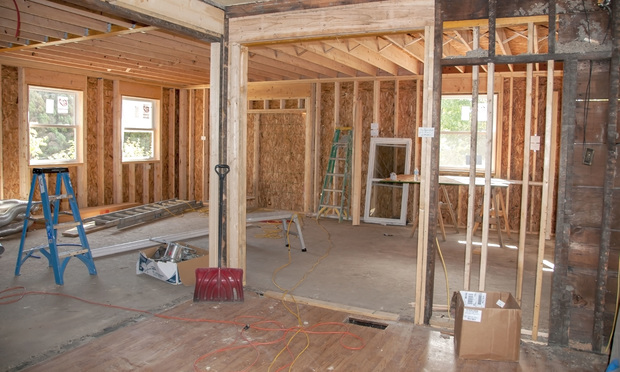Pa. Justices Reject Bid to Require Arbitration of Case Against Toll Bros. Over Construction Flaws
The high court's decision lets stand the frontline appeals court's ruling that secondary buyers were not bound by original warranty agreements—which included mandatory arbitration provisions—between the real estate developer and the first purchasers of the homes.
April 23, 2020 at 03:12 PM
4 minute read
 Photo: John Panella/Shutterstock.com
Photo: John Panella/Shutterstock.com
Dozens of lawsuits against the home-building company Toll Brothers Inc. are set to play out in state court after the Pennsylvania Supreme Court rejected the company's move to corral the cases into arbitration.
On Tuesday, the Supreme Court denied allocatur in the case, captioned Porter v. Toll Brothers. The decision lets stand a ruling from the Superior Court, which last summer determined that 30 cases against Toll Brothers brought by subsequent home buyers should be handled in state court, rather than through arbitration.
The high court's decision lets stand the frontline appeals court's ruling that secondary buyers were not bound by original warranty agreements—which included mandatory arbitration provisions—between the real estate developer and the first purchasers of the homes.
The Supreme Court's ruling, however, is likely to affect more than those 30 cases, as another Superior Court panel April 21 also allowed an additional seven cases to proceed in state court against the company, basing its ruling entirely on the intermediate court's earlier decision in Porter.
"This is a significant victory for our clients, who have endured so many sleepless nights over the condition of and repair costs of their homes, which are usually a family's largest asset," Jennifer M. Horn of Horn Williamson, who is representing the homeowners, said in a press statement. "This decision puts an end to Toll Brothers' attempts to draw out this long-running legal battle and enables these homeowners to pursue the justice they deserve."
Cozen O'Connor attorney Raymond DeLuca, who represented Toll Brothers, did not return a call seeking comment.
In August, a three-judge Superior Court panel rejected Toll Brother's arguments that the 30 lawsuits at issue in Porter should be sent to arbitration.
The cases involved homes that the Horsham-based company built and sold to the initial home buyers between 2002 and 2005. Separate from those sales agreements, Toll Brothers offered the purchasers a written 10-year warranty for their repairs. That warranty agreement was discussed in what the Superior Court referred to as form 1302, and the form also provided that, by agreeing to the warranty, the purchaser was also agreeing to handle any disputes in arbitration.
None of the subsequent home buyers ended up signing form 1302 when they bought their homes from the initial purchasers, and they all ended up suing Toll Brothers in the Philadelphia Court of Common Pleas between September 2017 and March 2018, alleging various counts of fraud, negligence, negligent misrepresentation and unfair trade practices. Although Toll Brothers sought to move the cases to arbitration, the trial court denied those efforts.
On appeal to the Superior Court, Toll Brothers argued the warranties automatically transferred to the subsequent home buyers, and signing the warranty agreements were not mandatory.
The Superior Court, led by Judge Mary Murray, however, disagreed.
"Appellant's alleged willingness to overlook the lack of an executed TB Form 1032 (in order to honor a claim from a subsequent purchaser) does not nullify or modify the clear terms of the warranty, and importantly, does not bind appellees to a contract they did not execute," Murray said. "It is undisputed that appellees did not sign the warranty or execute TB Form 1032. Accordingly, we agree with the trial court that the warranty does not bind appellees."
Toll Brothers further contended that, because the plaintiffs had been beneficiaries of the agreements, they could not simply ignore the arbitration demand, and cited federal case law to support its arguments. Toll Brothers noted that at least 15 of the plaintiffs had availed themselves of the warranties.
Murray, however, said the company's argument went against the plain language of the agreements, and further said Toll Brothers didn't give any reason why the case it cited, which dealt with mandatory arbitration agreements subject to the Federal Arbitration Act, should apply to a case brought under state law.
Judge Dan Pellegrini joined Murray. Judge Deborah Kunselman concurred, saying she thought Toll Brothers had made a good case for why the federal case should apply. However, she noted she wouldn't have granted the company relief on the issue.
"In every instance where one of the homeowners here attempted to seek remuneration under the warranty, Toll Brothers rejected the claim for one reason or another. Thus, no benefit at all came to any of these homeowners under the warranty," Kunselman said."That is why the homeowners sued Toll Brothers. Accordingly, Toll Brothers may not force the non-signatory homeowners into arbitration based upon a warranty under which they received no benefit."
This content has been archived. It is available through our partners, LexisNexis® and Bloomberg Law.
To view this content, please continue to their sites.
Not a Lexis Subscriber?
Subscribe Now
Not a Bloomberg Law Subscriber?
Subscribe Now
NOT FOR REPRINT
© 2025 ALM Global, LLC, All Rights Reserved. Request academic re-use from www.copyright.com. All other uses, submit a request to [email protected]. For more information visit Asset & Logo Licensing.
You Might Like
View All
Phila. Judge Upholds $68.5M Verdict Over Construction Worker's Death
3 minute read
Delivery Driver's Slip-and-Fall Suit Slides Forward Against Equipment Rental Company
4 minute read
Pa. Construction Law Update: Best Practices Learned From 3 Recent Appellate Decisions

Troutman Pepper Accused of Inattentive Case Management in $59M Malpractice Suit
7 minute readLaw Firms Mentioned
Trending Stories
Who Got The Work
J. Brugh Lower of Gibbons has entered an appearance for industrial equipment supplier Devco Corporation in a pending trademark infringement lawsuit. The suit, accusing the defendant of selling knock-off Graco products, was filed Dec. 18 in New Jersey District Court by Rivkin Radler on behalf of Graco Inc. and Graco Minnesota. The case, assigned to U.S. District Judge Zahid N. Quraishi, is 3:24-cv-11294, Graco Inc. et al v. Devco Corporation.
Who Got The Work
Rebecca Maller-Stein and Kent A. Yalowitz of Arnold & Porter Kaye Scholer have entered their appearances for Hanaco Venture Capital and its executives, Lior Prosor and David Frankel, in a pending securities lawsuit. The action, filed on Dec. 24 in New York Southern District Court by Zell, Aron & Co. on behalf of Goldeneye Advisors, accuses the defendants of negligently and fraudulently managing the plaintiff's $1 million investment. The case, assigned to U.S. District Judge Vernon S. Broderick, is 1:24-cv-09918, Goldeneye Advisors, LLC v. Hanaco Venture Capital, Ltd. et al.
Who Got The Work
Attorneys from A&O Shearman has stepped in as defense counsel for Toronto-Dominion Bank and other defendants in a pending securities class action. The suit, filed Dec. 11 in New York Southern District Court by Bleichmar Fonti & Auld, accuses the defendants of concealing the bank's 'pervasive' deficiencies in regards to its compliance with the Bank Secrecy Act and the quality of its anti-money laundering controls. The case, assigned to U.S. District Judge Arun Subramanian, is 1:24-cv-09445, Gonzalez v. The Toronto-Dominion Bank et al.
Who Got The Work
Crown Castle International, a Pennsylvania company providing shared communications infrastructure, has turned to Luke D. Wolf of Gordon Rees Scully Mansukhani to fend off a pending breach-of-contract lawsuit. The court action, filed Nov. 25 in Michigan Eastern District Court by Hooper Hathaway PC on behalf of The Town Residences LLC, accuses Crown Castle of failing to transfer approximately $30,000 in utility payments from T-Mobile in breach of a roof-top lease and assignment agreement. The case, assigned to U.S. District Judge Susan K. Declercq, is 2:24-cv-13131, The Town Residences LLC v. T-Mobile US, Inc. et al.
Who Got The Work
Wilfred P. Coronato and Daniel M. Schwartz of McCarter & English have stepped in as defense counsel to Electrolux Home Products Inc. in a pending product liability lawsuit. The court action, filed Nov. 26 in New York Eastern District Court by Poulos Lopiccolo PC and Nagel Rice LLP on behalf of David Stern, alleges that the defendant's refrigerators’ drawers and shelving repeatedly break and fall apart within months after purchase. The case, assigned to U.S. District Judge Joan M. Azrack, is 2:24-cv-08204, Stern v. Electrolux Home Products, Inc.
Featured Firms
Law Offices of Gary Martin Hays & Associates, P.C.
(470) 294-1674
Law Offices of Mark E. Salomone
(857) 444-6468
Smith & Hassler
(713) 739-1250





